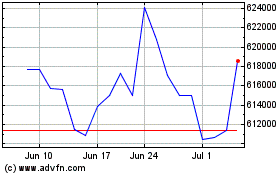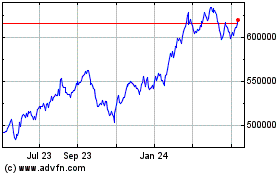Potential successors made $1 billion wager, a rare foray into
tech for Berkshire Hathaway
Anupreeta Das
Warren Buffett's Berkshire Hathaway Inc. disclosed Monday that
it had made a $1 billion bet on Apple Inc. stock earlier this year,
boosting the iPhone maker's market value by more than $18
billion.
But to the cottage industry that fervently follows the world's
most famous investor, it just didn't seem like a move Mr. Buffett
would make.
It wasn't, as it turns out. Instead, it was among the largest
investments yet by the two former hedge-fund managers that Mr.
Buffett brought on board as potential successors to run his
company's $129 billion stock portfolio.
Mr. Buffett has long voiced his aversion to investing in
technology companies. Four years ago, he specifically ruled out
investing in Apple.
But Todd Combs, who joined Berkshire in 2011, and Ted Weschler,
who arrived a year later, have shown a willingness to wade into
corners of the market that Mr. Buffett won't touch, including the
tech sector.
The investment shows the amount of rope Mr. Buffett is willing
to give his protégés, as the legendary stock picker, who turns 86
years old in August, prepares Berkshire for a future without him at
the helm. In an email Monday, Mr. Buffett didn't say whether Mr.
Combs or Mr. Weschler made the call. But he said they each make
investment decisions without consulting him first.
The Apple position gives Berkshire a rare sizable stake in a
technology company. Its first was Mr. Buffett's $11 billion
investment in International Business Machines Corp. Mr. Buffett
made that investment in 2011 and has expanded it, most recently
early this year. IBM shares have dropped roughly 20% since
Berkshire disclosed its stake, as the company tries to turn itself
around.
The IBM investment left many Berkshire shareholders, analysts
and others scratching their heads. Mr. Buffett had long expressed
caution when it comes to tech companies. In his 1996 annual letter
to shareholders, he wrote that "many companies in high-tech
businesses or embryonic industries will grow much faster in
percentage terms...But I would rather be certain of a good result
than hopeful of a great one."
His opinion hadn't changed much as of Berkshire's annual
shareholder meeting in 2012, where Mr. Buffett said he wouldn't
invest in Google Inc. or Apple. "I just don't know how to value
them," he said.
That position changed sometime in the first quarter for
Berkshire, when Mr. Combs or Mr. Weschler bought the stock. Apple's
shares were trading in the mid-90s for much of that time. They
closed Monday up 3.7% at $93.88 but are still down nearly 11% this
year.
The tech giant's stock has been battered partly because of a
slowdown in iPhone sales, as Apple struggles to keep up the strong
growth that followed the introduction of its larger-screen
smartphones in late 2014. The 2015 successors to those initial
big-display models haven't garnered as much enthusiasm from
consumers. Last month, Apple reported its first quarterly revenue
decline since 2003.
In an interview with The Wall Street Journal at the time, Apple
Chief Executive Tim Cook said it was "a challenging quarter," but
he dismissed concerns that the company was in decline. He
attributed the slump to short-term factors such as the strong
dollar, difficult economic conditions and difficult comparisons for
iPhone sales. "It's a tough bar to hurdle, but it doesn't change
the future," he said. "The future is very bright."
Berkshire's investment managers, each of whom manages around $9
billion, appeared to agree. The Omaha, Neb., conglomerate said in a
securities filing it owned 9.81 million shares of Apple as of March
31, valued at roughly $1.07 billion. Those shares are now valued at
around $920 million.
Despite Mr. Buffett's concerns about technology, they are buying
into a company with many of the traits the billionaire investor
likes. Apple arguably has a durable "economic moat" -- or
competitive advantage -- in its more than one billion devices in
active use and constellation of services like iTunes and the App
Store that keep users tied to its devices. It also has a
predictable cash flow, and the share-price plunge likely presented
a buying opportunity.
On the other hand, Apple, like all technology companies, faces
the risk that a competitor with a more compelling product could
arise out of nowhere and reshape the industry -- as Apple did over
the past decade, devastating once powerful companies like Motorola
and Nokia.
"It appears to be a low-risk investment with considerable upside
potential...however, I do not think this is an investment that
Buffett would make," said David Kass, a Berkshire shareholder and
finance professor at the University of Maryland business school.
"Todd Combs and/or Ted Weschler...perhaps have a better
understanding of the competitive advantages Apple possesses vis a
vis the technological challenges it might face in the years
ahead."
Berkshire's investment in Apple -- the firm's only new position
taken in the quarter -- follows the exits of well-known investors
Carl Icahn and David Tepper. Mr. Icahn said last month that he had
sold his big stake, telling CNBC at the time that Apple is a great
company but no longer a "no-brainer" as an investment choice. He
said he worried about the company's ability to succeed in
China.
Mr. Icahn made his initial investment, reported to be worth
about $1.5 billion, in 2013. He subsequently bought more shares and
called for the company to boost its stock buybacks.
Mr. Tepper's Appaloosa Management LP disclosed his sale in a
securities filing Friday.
Mr. Combs received an endorsement of his stock-picking skills
when Mr. Buffett closed a deal to buy aerospace company Precision
Castparts Corp. for $32 billion earlier this year. Mr. Combs began
buying shares of Precision in 2012, a year after he joined
Berkshire, but Mr. Buffett hadn't followed the company closely
until last year.
Although Mr. Combs didn't suggest the deal to his boss, many
Berkshire shareholders were reassured that the investment managers
were picking stocks that Mr. Buffett approved of. The two men are
part of a succession plan that Mr. Buffett has put in place at
Berkshire, where his roles as chief executive, chairman and
investment manager will be split into three. Mr. Buffett has said
his son, Howard Buffett, will be Berkshire's nonexecutive chairman.
He hasn't revealed who will replace him as CEO and oversee the
conglomerate's giant insurance, industrial, utility and other
operations.
Berkshire's two stock pickers, along with Mr. Buffett's
financial assistant Tracy Britt Cool -- he calls them the "three
T's" -- are closely involved with various aspects of Berkshire's
operations. Both Mr. Combs and Mr. Weschler have worked on deals
for the conglomerate, for no extra money, as Mr. Buffett likes to
say. Mr. Weschler flew to Germany several times in 2015 to
negotiate Berkshire's deal to buy motorcycle gear maker Detlev
Louis Motorradvertriebs GmbH.
The two managers also jointly bought DirecTV stock before it was
acquired by AT&T Inc. in 2015, having built up a position worth
nearly $3 billion to become the satellite company's second-largest
shareholder. Berkshire made a tidy profit from the deal, given that
they had bought DirecTV shares for much cheaper than what AT&T
paid for them.
Mr. Buffett has said that the big, multibillion-dollar stock
holdings are his picks, whereas his two investment managers
typically buy smaller positions of a few hundred million dollars.
Among picks thought to be theirs are companies such as Mastercard
Inc., Visa Inc. as well as tech companies like data-analytics firm
Verisk Analytics Inc. and Verisign Inc., an Internet domain name
provider.
"Hiring these two was one of my best moves," Mr. Buffett said in
his latest annual letter.
--Lauren Pollock and Erik Holm contributed to this article.
Corrections & Amplifications: Berkshire exchanged most of
its position in Procter & Gamble in the quarter to buy
Duracell. An earlier version of this article incorrectly stated the
firm sold off the shares. (May 16)
(END) Dow Jones Newswires
May 17, 2016 02:49 ET (06:49 GMT)
Copyright (c) 2016 Dow Jones & Company, Inc.
Berkshire Hathaway (NYSE:BRK.A)
Historical Stock Chart
From Mar 2024 to Apr 2024

Berkshire Hathaway (NYSE:BRK.A)
Historical Stock Chart
From Apr 2023 to Apr 2024
